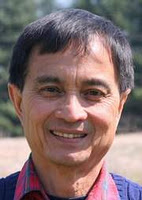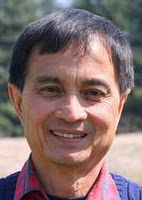A. Gaffar Peang-Meth
now browsing by tag
Lessons for toppling dictators
Lessons for toppling dictators
A. Gaffar Peang-Meth
PACIFIC DAILY NEWS
Popovic tells us we need analytical skills in “unity, planning, and nonviolent discipline” to succeed in a revolution. He tells us of the working of the dynamics of enthusiasm and humor vs. fear and apathy: As enthusiasm and humor go up, fear and apathy go down, and vice versa. And he tells us to select strategy and tactics: Start small and pick the battle one can win.
 I ended 2011 with a column on Lord Buddha’s teachings from 2,500 years ago about man as an activist, an “actionist,” and a maker of the world. As 95 percent of Cambodia’s 14 million people identify themselves as Buddhist, I deduced that Cambodians are activists and “actionists” who can transform autocratic Cambodia into a Buddhist country of civil rights, justice, and compassion.
I ended 2011 with a column on Lord Buddha’s teachings from 2,500 years ago about man as an activist, an “actionist,” and a maker of the world. As 95 percent of Cambodia’s 14 million people identify themselves as Buddhist, I deduced that Cambodians are activists and “actionists” who can transform autocratic Cambodia into a Buddhist country of civil rights, justice, and compassion.Posted in Culture, Education, Politics, Researches, Social | Comments Off on Lessons for toppling dictators
Tags: A. Gaffar Peang-Meth, Buddha, Dictator, Non-violence, Revolutionist
Revolutionists follow Buddha’s teachings
Buddha characterized those who dwell in the past, which cannot be changed, as stuck, and said that those who dream of an imagined future equally waste the present moment, the here and now that provide an opportunity for one to influence the future.
Buddha did not tell us not to learn from the past. He taught us to learn from it, but not to live in it, which boxes us in, making us unable to move forward to the future, which will be created based on the actions we take in the present day. “I never see what has been done; I only see what remains to be done,” said Buddha.
PACIFIC DAILY NEWS
Dec. 28, 2011
Revolutionists follow Buddha’s teachings
A. Gaffar Peang-Meth
In three days, the New Year 2012 will be upon us. The next 366 days await. What we do or do not do will influence our future. As usual in the holiday season, we reflect on what we have or have not done as we contemplate our new year resolutions.
As I wish all readers, Christians and non-Christians, a merry Christmas and a happy New Year, I find in this occasion a good opportunity to write on Lord Gautama Buddha’s teachings from 2,500 years ago, which continue to provide good lessons for mankind today.
Past, present, future
The past is a lesson for the present. The present is a guide for the future. Spanish philosopher George Santayana said, “Those who cannot learn from history are doomed to repeat it.” Earlier, German revolutionary socialist Karl Marx asserted, “History does nothing; it does not possess immense riches, it does not fight battles. It is men, real, living, who do all this.”
CAMBODIA: The people must no longer wait for Preah Batr Dhammik to come to their rescue
FOR PUBLICATION
A nation of 14 million people, of whom 95 percent are Buddhist, Cambodians should be perfect actors for change. Their Lord Buddha preached, “To be idle is a short road to death and to be diligent is a way of life.” He counseled men to be activists and “actionists.” Do Cambodians who talk Buddha’s talk, also walk his talk? As Buddha asked: “What good will do if you do not act upon them?”
AHRC-ETC-057-2011
December 15, 2011
An article by Dr. Gaffar Peang-Meth published by the Asian Human Rights Commission
CAMBODIA: The people must no longer wait for Preah Batr Dhammik to come to their rescue
Dr. Gaffar Peang-Meth
The end of 2011 is filled with less than happy news on Cambodia and her people that dampens the holiday mood. On the first of December, Radio Free Asia presented a somber broadcast on the culture of corruption permeating Khmer youth, starting with kindergarten children, the teaching corps, and moving up to education officials in government. Allegations of corruption at this foundational level do not bode well for Cambodia’s future.
The report on corruption by RFA’s Keo Pich Meta began with an illustrative Khmer saying “Tumpaeng snorng russei,” which refers to bamboo shoots that will grow and replace aging bamboo trees. Bamboo shoots are the nation’s future pillars. The saying counsels children to go to school, study hard, become educated, to help build a prosperous country.
RFA’s report describes unspecified numbers of Khmer children and youth, the bamboo shoots, who are unlikely to grow up to become strong future pillars of a broadly prosperous society. They have fallen prey to societal ills, drugs, laziness, a lack of desire to learn, an avoidance of schooling, among other things. Of course there are children and youth going to school, the report says, but in the course of their schooling it has become customary to bribe teachers for better grades so students can move to the next level.
Having learned a culture of corruption at such a young age, these small bamboo shoots will probably carry the culture of societal ills with them as they grow.
Numbing the spirit, hurting the dignity
Neither was the news from Cambodia in November encouraging to those who advocate for Cambodians’ civil rights. In late November, the small community of people of Boeung Kak Lake – those left from the original 4,000-plus residents who were victims of forced eviction – took to the streets to protest against the real estate firm Shukaku Inc., owned by ruling Cambodian People’s Party Senator Lao Meng Khin. The people of Boeung Kak Lake were holding on desperately to the 12.44 hectares of land that remains after the lake and adjacent 120 hectares were co-opted by the government and leased for 99 years to Shukaku for development.
Posted in Culture, Economics, Education, Politics, Researches, Social | Comments Off on CAMBODIA: The people must no longer wait for Preah Batr Dhammik to come to their rescue
Tags: A. Gaffar Peang-Meth, Moneychenda, Preah Bat Dhammik
Danger of new autocrats underestimated
The new autocrats’ priority is political control: A person prepared to acknowledge the ruling group’s supremacy and follow its directives is allowed a certain amount of autonomy to operate. “Loyalists are rewarded, enemies are punished, the neutral are neglected or casually abused,” says the report…
On Cambodia, Kurlantzick writes, “members of China’s Communist Party have advised Prime Minister Hun Sen’s party on how to use laws for libel and defamation to scare the independent media, create a network of senior officials who can control major companies, and instill loyalty in special police and bodyguard forces.”
PACIFIC DAILY NEWS
 Dec. 14, 2011
Dec. 14, 2011
Danger of new autocrats underestimated
A. Gaffar Peang-Meth
Two years ago, I presented in this space a June 2009 posting in Foreign Policy Online titled “Authoritarianism’s New Wave,” about a “new class of autocrats” and their “most serious challenge” to the rules of law, human rights, and open expression. The piece was jointly written by Jennifer Windsor, Jeffrey Gedmin and Libby Liu, of Freedom House, Radio Free Europe, and Radio Free Asia, respectively.
The three organizations also published a report, “Undermining Democracy: 21st Century Authoritarians,” on the strategies and methods of five countries — China, Iran, Pakistan, Russia and Venezuela — “to impede human rights and democratic development” within and beyond their borders.
The report asserted “advocates for freedom” — democrats in those countries — receive little attention and few resources from the democratic world because the systems that persecute them “are poorly understood” and that Western “policymakers do not appear to appreciate the dangers these 21st century models pose to democracy and rule of law around the world.”
Posted in Economics, Education, Politics, Researches, Social | Comments Off on Danger of new autocrats underestimated
Tags: A. Gaffar Peang-Meth, China and the impeding of democracy, modern autocrats











